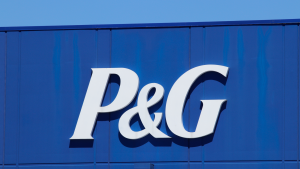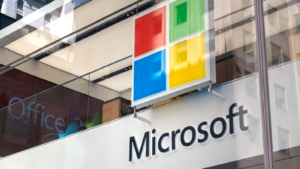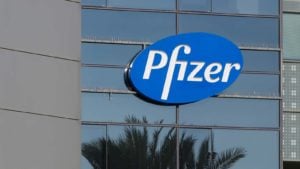It’s an interesting time in the market, which may bode well for conservative ideas found among blue-chip stocks. Underlying this category are some of the strongest, most established businesses and brands in the world, making them ideal for addressing various anxieties.
One of the biggest concerns centers on a recent outflow of funds from technology enterprises. In one week, this sector saw outflows amounting to $4.4 billion, a record tally. Further, investment-grade bonds saw significant inflows. Translation? The smart money is diversifying their exposure to risk-on assets.
Now, I don’t think anyone is suggesting an outright panic. However, it’s just a good idea to consider risk mitigation. On that note, below are blue-chip stocks that can plow through a wall of worries.
Home Depot (HD)

Source: Jonathan Weiss / Shutterstock.com
Fundamentally, Home Depot (NYSE:HD) ranks among the best blue-chip stocks because of its vast relevancies. No matter the situation, everyone eventually finds themselves needing home repair solutions. And even if you rent an apartment, the landlord must take care of issues that arise. So, HD stock effectively benefits from a predictable business model.
Let’s talk financials. Home Depot isn’t exactly what you call an exciting enterprise. However, it consistently beats analysts’ targets in terms of earnings per share. Indeed, data from Yahoo Finance reveals that the average positive earnings surprise for HD in the last fiscal year (2024) came out to 2.15%.
For the current fiscal year (2025), experts believe that the specialist retailer will post EPS of $15.36 on revenue of $154.36 billion. That’s actually a sizable jump from fiscal 2024’s print of earnings of $13.97 on sales of $141.19 billion.
Also, it offers a decent forward annual dividend yield of 2.35%. Again, it’s a great idea for blue-chip stocks to buy.
Procter & Gamble (PG)

Source: Jonathan Weiss / Shutterstock.com
Two attributes make household goods giant Procter & Gamble (NYSE:PG) incredibly relevant during this uncertain period in the market. First, everybody needs household goods, whether we’re talking about cleaning supplies or toilet paper or what have you. So, P&G benefits from a consistent demand profile. Second, the brand enjoys generational awareness. Think of the products your parents used. You’ll probably do the same.
Therefore, I’m not really worried about what anyone thinks about PG stock. If you have jitters about the market’s forward trajectory, P&G is the name to trust. Also, the company has demonstrated its reliable nature through its financial performance. Last fiscal year, it posted an average positive earnings surprise of 5.58%.
For the current fiscal year, experts believe that EPS will land at $6.45 on revenue of $84.78 billion. That seems reasonable given the prior history. Last year, P&G posted EPS of $5.90 on revenue of $82 billion.
Lastly, it offers a forward annual dividend of 2.32%. It makes for a solid case for blue-chip stocks.
McDonald’s (MCD)

Source: Vytautas Kielaitis / Shutterstock
People talk a good game but at the end, we love indulging in fast food. Therefore, McDonald’s (NYSE:MCD) makes a strong case for blue-chip stocks to buy. It’s not just because every time I drive by my local Micky D’s, I see a massive line in its drive-thru lanes. Rather, the company’s three-year revenue growth rate stands at 10.8%, above 70% of the competition.
Another reason to consider MCD stock is the underlying earnings history. We hear so much about consumers tightening their wallets. That’s been particularly evident in the broader restaurant space. However, the Golden Arches just keeps marching forward. Last fiscal year, the company posted an average positive earnings surprise of 9.35%.
For the current fiscal year, analysts anticipate that EPS will land at $12.44 on revenue of $26.89 billion. That’s a significant improvement over last year’s print of $11.04 on sales of $23.58 billion. Further, experts believe that MCD sales will hit $28.51 billion in fiscal 2025.
In closing, the fast-food giant offers a forward yield of 2.37%.
Target (TGT)

Source: Sundry Photography / Shutterstock.com
During periods of uneasiness, putting the spotlight on big-box retailers makes plenty of sense. Look at Target (NYSE:TGT). Over the years, the company has added groceries into its retail mix along with a host of other products. Many locations also offer services such as optometry. It’s really become a one-stop shop, making it incredibly convenient for consumers.
To be fair, Target has incurred some serious challenges, most notably with retail theft. However, the company has fought back and the results cannot be denied. Last fiscal year (2024), the company’s average positive earnings surprise clocked in at nearly 28%. Its top performance came during the quarter ended Oct. 30, 2023, when it posted EPS of $2.10 against expectations for $1.48.
For fiscal 2025, analysts do see some turbulence, projecting revenue of only $107.22 billion on average. That’s a bit below last year’s print of $107.41 billion. Still, this metric may rise to $111.24 billion in fiscal 2026.
For waiting, Target rewards investors with a forward dividend yield of 2.48%.
Berkshire Hathaway (BRK-B)

Source: IgorGolovniov / Shutterstock.com
As an industrial conglomerate that bets on everything, Berkshire Hathaway (NYSE:BRK-B) makes an intriguing case for blue-chip stocks to buy. Also, you can’t forget one of the great benefits of investing in BRK.B stock: the residual wisdom of Warren Buffett, the Oracle of Omaha. He knows his way around bull markets and bear markets, which is what you need right now.
To be fair, Berkshire hasn’t been perfect. It performed well in the first three quarters of last year, posting an average positive earnings surprise of nearly 11%. However, in the fourth quarter, it printed EPS of $3.63. That was 4 cents lower than anticipated.
For fiscal 2024, analysts believe that EPS will land at $18.55. That’s a significant improvement over last year’s result of earnings of $15.90 per share. However, revenue is expected to reach only $332.2 billion, down from $337.07 billion in fiscal 2023.
Still, there could be a recovery in 2025 to sales of $349 billion. Again, it’s important to realize that Buffett has seen his fair share of bearish cycles.
Microsoft (MSFT)

Source: The Art of Pics / Shutterstock.com
A world-renowned tech giant, Microsoft (NASDAQ:MSFT) makes the list of blue-chip stocks to buy for its utilitarian nature. Yes, the focus right now is the company’s big investments in artificial intelligence that are paying off handsomely. However, it has also invested in significant innovations such as cloud computing and its own Software-as-a-Service (SaaS) solutions.
Financially, Microsoft no longer presents the exciting, speculative narrative that it once did. However, now the name of the game is consistency, which the tech firm performs quite well. For fiscal 2023, its average positive earnings surprise landed at 8.4%. Its best performance came in Q3, when it posted per-share earnings of $2.73 against a target calling for $2.42.
For fiscal 2024, experts project that EPS will land at $11.65 on revenue of $244.22 billion. That’s a major improvement over last year’s print of $9.81 on sales of $211.91 billion. For fiscal 2025, analysts believe revenue could soar to $279.19 billion, implying 14.3% year-over-year growth.
You’re going to pay 31.55X forward earnings for the privilege but that seems a decent deal contextually.
Pfizer (PFE)

Source: photobyphm / Shutterstock.com
A pharmaceutical giant, Pfizer (NYSE:PFE) skyrocketed during the Covid-19 crisis. Obviously, it helped forward a vaccine for the SARS-CoV-2 virus. However, with the pandemic fading into the rearview mirror, so too did the urgency for the vaccine and related treatments. Subsequently, PFE stock cratered. The volatility is understandable but the continued printing of red ink may be overdone.
Let’s look at the earnings history. With the adjustments considered for the post-pandemic paradigm, Pfizer has actually outperformed expectations. Last fiscal year, the company posted an average positive earnings surprise of 59.5%. It enjoyed its best performance in Q4, when it delivered EPS of 9 cents against expectations of a loss of 20 cents.
For the current fiscal year, analysts believe EPS will reach $2.20 on revenue of $59.98 billion. That’s a conspicuous step up from last year’s results of $1.70 EPS on sales of $54.1 billion.
Pfizer is also modestly undervalued, trading at a forward earnings multiple of 12.82X. It also offers a massive forward dividend yield of 6.05%.
On the date of publication, Josh Enomoto did not have (either directly or indirectly) any positions in the securities mentioned in this article. The opinions expressed in this article are those of the writer, subject to the InvestorPlace.com Publishing Guidelines.

